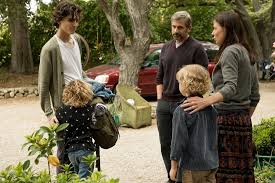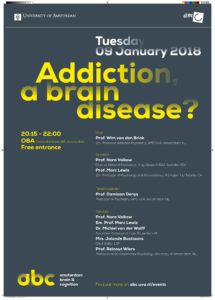Stalking the disease model: One last tirade for 2013
Over the last year, I’ve explored the terrain between meaning and dogma, choice and compulsion, I’ve taken you with me to Dharamsala, found surprising convergences between Buddhist philosophy and dopamine metabolism, pondered the application of mindfulness to treatment. But the theme I seem to land on most is the search for an alternative to the disease model of addiction — a way to understand addiction that does not pit disease against choice, or self-medication against self-indulgence. So for this final post of the year, I want to bring this discussion to some sort of close. Not a final answer: no way. But a plateau where it’s possible to set up camp and rest a bit before delving further into the wilderness of this almost intractable problem we’ve all lived with one way or another.
Because I’m feeling stuffed, indulgent and lazy, as I hope you are too this Christmas day, I’ll just copy and paste a few paragraphs from the first chapter of the book I’m working on. It’s just a draft at this point, more revision to be done, but I think this captures the kernel of what I want my book to say:
“Among the opponents of the disease model, almost no one has fought fire with fire and tackled the neuroscience behind it. Most of those arguing against the disease model, like the general public, are spellbound, if not paralyzed, by the notion of “brain change.” … It’s almost as if students of addiction make a choice: either admit the brain is a really important organ, in which case addiction is a brain disease, or put the brain back in the closet, in which case you can go on talking about choice, environmental factors, social anthropology, and all the rest of it.
This strikes me as exceptionally odd. Surely the brain that underlies addiction is the same brain that we use to perceive and respond to our environments, make choices, and reflect on the benefits of being high — in context. So it seems extremely likely that the brain is fundamental to addiction, whether we construe addiction as a disease, a choice, or a self-medication strategy.
The fact is: brains change. They’re supposed to. These days it’s called neuroplasticity. Brain change is the fundamental mechanism by which infants grow into toddlers who grow into children who grow into adults. Brain change underlies the transformations in thinking and feeling that characterize early adolescence. (By some estimates, the prefrontal cortex loses 30,000 synapses per second during this period.) Brain change is necessary for perspective-taking and language acquisition in early childhood, and for falling in love, with a partner or with one’s children, later in life. And for learning to play a musical instrument or appreciate opera. Brains have to change for learning to take place. Without physical changes in brain matter, learning is impossible. Synapses appear and self-perpetuate or weaken and dissipate. These processes alter the communication patterns between brain regions and build unique configurations of synapses (synaptic networks) that represent knowledge, familiarity, and memory itself. The relation between learning and brain change has been studied for more than 100 years, it was reasonably well understood by the 1940s, and the search for specific cellular mechanisms of learning continues to point to new levels and mechanisms of change. Whether repairing the damage caused by a minor stroke or altering emotional processes in the wake of trauma, neuroplasticity is at the top of the brain’s resumé.
Proponents of the disease model argue that addiction changes the brain. And they’re right: it does. But the brain is designed to change. It’s primary functions — to think, feel, remember, and act — are served by structural transformations at every level, from gene expression to the size and shape of the cortex itself. The premise that brain change equals brain disease is so ill-founded, it’s hard to know exactly where to start chopping.
A new model of addiction and a plan for the book
This book makes the case that addiction results from accelerated learning — the acquisition of thought patterns that rapidly self-perpetuate because of the brain’s tendency to become sensitized to highly attractive rewards. I see this as a developmental process, accelerated by a neurochemical feedback loop that’s particular to strong attractions. Like other developmental outcomes, addiction isn’t easy to reverse, because it’s based on synaptic restructuring. Like other developmental outcomes, it arises from neural plasticity and uses it up at the same time. Addiction is definitely bad news for the addict and all those within range. But the severe consequences of addiction don’t make it a disease, any more than the consequences of violence make violence a disease, or the consequences of racism make racism a disease, or the folly of loving thy neighbour’s wife make infidelity a disease. What they make it is a very bad habit…
This book shows why the disease model is wrong — and how that wrongness is maintained by a biased view of the neural data. Then it shows how we can replace the disease model, not by shunning the biology of addiction but by examining it more closely. Rather than throw the brain out with the bathwater, as some anti-disease crusaders have attempted, I examine brain changes under a microscope that integrates depth and detail. And I show them to be developmental changes in an organ designed to restructure itself. I show how common neurodevelopmental processes yield uncommon results when we become attached to a narrow set of goals that squeeze out the competition….
I show how addiction arises through neural changes that constitute development, not disease — changes that nevertheless conspire to make it increasingly hard to quit. And I show how recovery is achieved when addicts continue to develop, by strengthening new connections among desire, self-regard, and self-control.”
So, stay tuned. The book, to be released in 2014, will spell out this meta-perspective through the telling of biographical accounts, slices of the incredible life stories some of you have shared with me — or who still might talk with me when I finally catch up enough to email, skype, and/or call you. And I’ll connect these stories to the science of brain change in a way that I hope will be accessible, persuasive, and un-put-downable as they say on back covers.
But as far as this blog goes, I think I’ll give this debate a rest — and move on to other things. We all need a break.
With that in mind, Happy Holidays, Happy New Year, get some rest, some peace, some refreshment, and some fun. Thanks for going the distance with me this year…and I promise to be staring at you from your inbox, once again, in 2014.
 With Ben is Back, there was Julia Roberts’ compelling angst, and now, with A Beautiful Boy (which I also read), we feel that intense heartbreak of a parent who can do nothing more to help.
With Ben is Back, there was Julia Roberts’ compelling angst, and now, with A Beautiful Boy (which I also read), we feel that intense heartbreak of a parent who can do nothing more to help.  Only to keep loving…and losing…as if his son had cancer or leprosy. I guess I’m mad and that’s why my words are coming out this way. There is something fundamentally wrong in these portrayals. Yes, they get the drama, the heartbreak, the power of drug highs. They get the agonizing schism between the teen or young adult lost in drugs and the (generally divorced) parents who still love their kid intensely. All that is worthwhile and important. But what they don’t get is the experience. They don’t even try to approximate, to estimate, to guess at what these young drug addicts are experiencing (other than deep sighs and stretches and rapturous smiles). Why is this so opaque?
Only to keep loving…and losing…as if his son had cancer or leprosy. I guess I’m mad and that’s why my words are coming out this way. There is something fundamentally wrong in these portrayals. Yes, they get the drama, the heartbreak, the power of drug highs. They get the agonizing schism between the teen or young adult lost in drugs and the (generally divorced) parents who still love their kid intensely. All that is worthwhile and important. But what they don’t get is the experience. They don’t even try to approximate, to estimate, to guess at what these young drug addicts are experiencing (other than deep sighs and stretches and rapturous smiles). Why is this so opaque? I mean, if we can create film after film about the Vietnam War and experience the shame, guilt, and horror of soldiers watching their friends die and their deepest values twisted inside out, why can’t we even come close to portraying — not what the parent is feeling — yes, that’s important too — but what the young addict is experiencing? What could be more dramatic than that? (And isn’t that supposed to be the crisis of our time?)
I mean, if we can create film after film about the Vietnam War and experience the shame, guilt, and horror of soldiers watching their friends die and their deepest values twisted inside out, why can’t we even come close to portraying — not what the parent is feeling — yes, that’s important too — but what the young addict is experiencing? What could be more dramatic than that? (And isn’t that supposed to be the crisis of our time?)

 either one. Yes, we want that. But at 18 or 20, we can’t create it. We can only rent that property from parents who settled there and established a home there. We can only copy, and please, and behave ourselves, trading our youthful energy for the security we could never find elsewhere. And guess what: that’s not enough.
either one. Yes, we want that. But at 18 or 20, we can’t create it. We can only rent that property from parents who settled there and established a home there. We can only copy, and please, and behave ourselves, trading our youthful energy for the security we could never find elsewhere. And guess what: that’s not enough.

 excellent second choice. Judging by his picture and digital presence, I expected a slightly stodgy, soft-spoken academic/scientist type who saw addiction as a disease.
excellent second choice. Judging by his picture and digital presence, I expected a slightly stodgy, soft-spoken academic/scientist type who saw addiction as a disease. Informed by unparalleled neuroscientific insight and written with his usual flare, Marc Lewis’s The Biology of Desire effectively refutes the medical view of addiction as a brain disease. A bracing and informative corrective to the muddle that now characterizes public and professional discourse on this topic.” —Gabor Maté, M.D., author of In The Realm of Hungry Ghosts: Close Encounters With Addiction
Informed by unparalleled neuroscientific insight and written with his usual flare, Marc Lewis’s The Biology of Desire effectively refutes the medical view of addiction as a brain disease. A bracing and informative corrective to the muddle that now characterizes public and professional discourse on this topic.” —Gabor Maté, M.D., author of In The Realm of Hungry Ghosts: Close Encounters With Addiction
Recent Comments